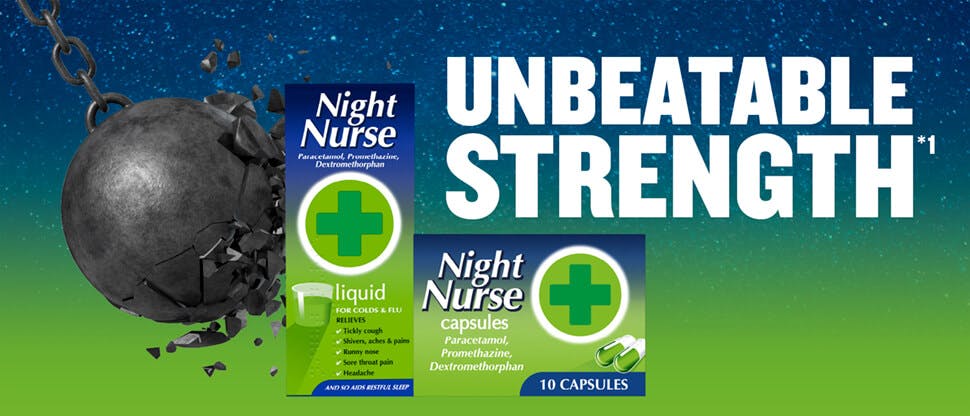Night Nurse / Night Nurse Capsules (paracetamol, promethazine hydrochloride, dextromethorphan hydrobromide). Indications: Symptomatic relief of colds, chills and influenza at night. Dosage: Adults and children 16 years and over: 20 ml or 2 capsules before bed. Maximum daily dose: Only one dose should be taken per night. Allow at least four hours between taking any paracetamol-containing product and this product. Do not take if you have already taken 4 doses of a paracetamol containing product during the day. Max duration of use is 3 days. Not to be given to children under 16 years except on medical advice. Contraindications: Hypersensitivity to the active ingredients or any of the excipients. Patients with or at risk of developing respiratory failure and patients taking or have taken monoamine oxidase inhibitors (MAOIs) in the last two weeks. Warnings and precautions: Contains paracetamol. Avoid use of other antihistamine-, paracetamol- and decongestant-containing preparations, including topical and cough and cold medicines. Medical advice must be sought for patients with severe hepatic or renal impairment, chronic or persistent cough, cough accompanied by excessive secretions, depleted glutathione levels due to metabolic insufficiencies, narrow angle glaucoma, cardiovascular problems, prostatic hypertrophy, urinary retention, epilepsy. Also seek medical advice for those taking tricyclic antidepressants, selective serotonin reuptake inhibitors, CNS depressants and anticholinergics. Use with caution in elderly. Patients with rare hereditary problems of galactose intolerance, the Lapp lactase deficiency (Night Nurse Capsules only) or glucose-galactose malabsorption should not take this medicine. Avoid alcohol. Prolonged use may lead to addiction, even at therapeutic doses. Cases of dextromethorphan abuse and dependence have been reported. Concomitant use with serotonergic agents can result in serotonergic effects, including serotonin syndrome, which should trigger discontinuation of the product. Caution should be exercised in patients who are slow metabolizers of CYP2D6 or use CYP2D6 inhibitors. Medical advice should be sought if symptoms persist, or are accompanied by high fever, skin rash or persistent headache. May cause urine pregnancy tests to produce false results. Liquid only: Contains 18% v/v ethanol per dose - Harmful for those suffering from alcoholism. Contains12.8g glucose and 3mg sodium per dose - Caution must be taken in patients with diabetes mellitus and those who are on a low sodium diet. Side effects: See SPC for full details. Hypersensitivity reactions including anaphylaxis and skin reactions, such as skin rashes, angioedema, SJS, drug dependence and drug withdrawal syndrome, serotonin syndrome, blood dyscrasias, bronchospasm, hepatic dysfunction, gastrointestinal disturbance, nausea, vomiting, abdominal discomfort, drowsiness and dizziness, confusion, paradoxical excitation, psychomotor impairment, disturbance in attention, headache, dry mouth, eye disorders, blurred vision, urinary retention. Legal category: P. Product licence number: PL 44673/0070, 0071 MAH: Haleon UK Trading Limited, The Heights, Weybridge, Surrey, KT13 0NY, U.K. RRP (excl. VAT): Liquid: £8.13. Capsules: £5.42 Text prepared: Jan 2024.




